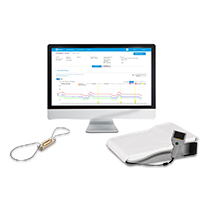With remote monitoring, you can gain critical information about your patient's cardiac health and heart failure progression. This connection with your patients allows you to intervene early and provide your patients with the personalized care they deserve. Learn how our connectivity and remote care devices can lead to better heart failure management.
CardioMEMS HF System and the Merlin.net Patient Care Network (PCN)
The CardioMEMS™ HF System is a pulmonary artery (PA) pressure monitoring system clinically proven to aid physicians in preventing worsening heart failure,1 lowering mortality rates2 and improving quality of life3,4 — even for HFpEF patients.5 The CardioMEMS HF System sends patient data to the Merlin.net™ Patient Care Network (PCN), so healthcare professionals have access to patients’ data transmissions via a secure website. Merlin.net PCN presents PA pressure data as actionable information to guide earlier, more appropriate intervention for each patient.
Heart Failure Management Powered by Remote Hemodynamic Monitoring
What if you knew your heart failure patient’s current hemodynamic data before making treatment decisions?
Imagine how your heart failure treatment plan would change if you had remote access to your patient’s:
- Preload status (RAM, PCWP)
- Afterload status (SVR, PVR)
- Pulmonary hypertension status (PAM, PVR)
Hemodynamic Data is Essential to Inform Personalized Heart Failure Management
The pulmonary artery (PA) is the only anatomical location in the body that provides hemodynamic data on both the right and left sides of the heart. With the CardioMEMS™ HF System, you can remotely monitor your patient’s PA pressure — all while they are living their life outside of the hospital.
The CardioMEMS™ PA Sensor is implanted during a standard RHC procedure, giving you the baseline RHC data to inform treatment strategy when used remotely with real-time PA pressures as a guide.
Hemodynamic monitoring can help you optimize individualized GDMT6 and prevent disease progression.7-9
References
- Adamson PB. Pathophysiology of the transition from chronic compensated and acute decompensated heart failure: new insights from continuous monitoring devices. Current Heart Failure Reports. 2009;6:287-292.
- Abraham J, Jonsson O, Oliveira G, et al. Lower Mortality and Heart Failure Hospitalization Rates in Patients Implanted with Pulmonary Artery Pressure Sensor – A Real-world Comparative Effectiveness Study (2018) Presented at the 67th Annual Scientific Sessions of the American College of Cardiology. JACC. 2018;71(11 Supplement):A311.7.
- Abraham WT, Stevenson LW, Bourge RC, Lindenfeld JA, Bauman JG, Adamson PB, for the CHAMPION Trial Study Group. Sustained efficacy of pulmonary artery pressure to guide adjustment of chronic heart failure therapy: complete follow-up results from the CHAMPION randomised trial. The Lancet. 2016;387(10017):453-461.5.
- Angermann, C.E., Assmus, B., Anker, S.D. et al. Safety and feasibility of pulmonary artery pressure-guided heart failure therapy: rationale and design of the prospective CardioMEMS Monitoring Study for Heart Failure (MEMS-HF). Clin Res Cardiol 107, 991–1002 (2018). https://doi.org/10.1007/s00392-018-1281-8
- Adamson PB, Abraham WT, Bourge RC, Costanzo MR, Hasan A, Yadav C, et al. Wireless pulmonary artery pressure monitoring guides management to reduce decompensation in heart failure with preserved ejection fraction. Circulation: Heart Failure. 2014;7(6):935-944.
- Brugts JJ, Radhoe SP, Clephas PRD, et al. Remote haemodynamic monitoring of pulmonary artery pressures in patients with chronic heart failure (MONITOR-HF): a randomised clinical trial [published correction appears in The Lancet. 2023;401(10394):2112]. The Lancet. 2023;401(10394):2113-2123. doi:10.1016/S0140-6736(23)00923-6
- Angermann C, Assmus B, Anker SD, et al. Pulmonary-artery-pressure-guided therapy in ambulatory patients with symptomatic heart failure: the CardioMEMS European monitoring study for heart failure (MEMS-HF). European J of Heart Failure. 2020;22(10):1891-1901.
- Cowie MR, Flett A, Cowburn P, et al. Real-world evidence in a national health service: results of the UK CardioMEMS HF System post-market study. ESC Heart Failure. 2021;9(1):48-56.
- Lindenfeld J, Zile MR, Desai AS, et al. Haemodynamic-guided management of heart failure (GUIDE-HF): a randomized controlled trial. The Lancet. 2021;398:991-1001.
MAT-2006720 v3.0

